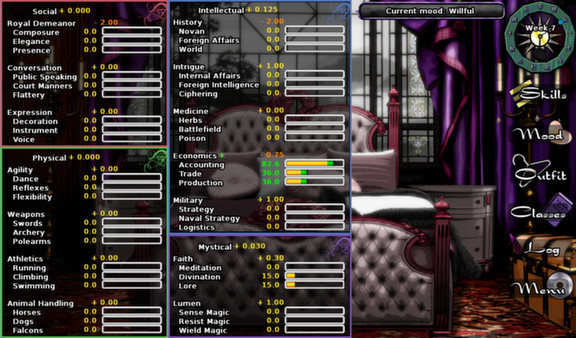I’m not exactly getting to this one in a timely fashion. Long Live the Queen is a visual novel/sim that has been out for a couple of years now, and people have been telling me to play it, and I’ve just been somewhat overwhelmed by how hard it is to get through. But now I have managed to win (once) and die (a lot of times), which is supposedly the correct proportion for this game.
The premise is that you are 14-year-old Elodie, the princess of a kingdom faced with internal and external strife, and you have to live through the 40 weeks until you turn 15 and are crowned. Every week you choose two subjects to study from a bewildering array (everything from Accounting to Divination, Elegance to Archery). Every weekend, you pick a weekend activity that affects your mood, which in turn affects your aptitude for different subjects. And each weekend you also face certain specialized story choices, which follow a consistent schedule. Winning is largely about learning which challenges are going to come up when and which skills you’ll need to have in order to overcome them, and training accordingly.
Quite a bit has already been written about LLtQ: about how hard it is, about how it compares with Princess Maker and Varicella. I want to talk about the cruelty stat.
This sounds like it’s going to be spoilery, but it’s really only mildly so: there are so many moving parts in this game that even a detailed analysis can leave a lot still to be uncovered.
As the images above suggest, LLtQ has a large number of exposed stats, and a smaller (I think?) number of hidden ones. Exposed are your mood scores and your skill ratings in each of the many skills you can train. Not shown, but implied and important, are the number of soldiers in your military, the amount of money in your treasury, how pleased with you your nobles and commoners are, and possibly some individual mood ratings down to individual NPCs. (I’m not sure about this: you’re often told that someone is displeased, but it’s not entirely clear how that is being tracked or when it’s being checked.) In some circumstances you can get a general sense of what those numbers might be — if you train your military skills up, you’re allowed to visit the barracks, for instance, which sometimes gives you a hint about your military strength, while training Accounting can lead to in-story clues about how much you can currently afford to spend.
Because the game is so extremely easy to lose and so unfair on the first playthroughs — there are lots of opportunities to die suddenly as a result of an event you had no real way of anticipating — the need to optimize generally triumphs over any attempts at role-playing. No, the fact that you as a player like dogs is not a good reason to train your Dogs stat to 100: Elodie’s got more important things to do. Expressions of player morality are also likely to go much the same direction. I’m not even sure it’s possible to get through the game without killing anyone, directly and indirectly: you’re under attack so much of the time, and even highly developed social skills won’t get you out of every scrape. Likewise romance: there are a whole bunch of romance-able NPCs, in theory, but in practice you’ll mostly find that your personal tastes have to take a back seat to what is expedient for the country.
In good accretive PC fashion, this creates the sense, across multiple plays, of a heroine who is doing no more or less than she has to. Sometimes that may mean spending a lot of money on a problem because there’s no easier way; sometimes it might be executing someone or sending assassins to take care of an opponent who otherwise will foment a civil war and cause thousands of deaths. In the circumstances, on (say) your fifth or tenth playthrough, that seems like a totally justified and even humane solution to the problem.
So I was playing this way, killing now and then but for what I considered to be excellent gameplay reasons, when I noticed that my weekend option to visit the dungeons had changed. On previous playthroughs, if I visited the dungeon, it might not affect my mood at all, or it might make me angry on behalf of the prisoners, or frightened by the threat of sharing a similar misfortune.
Now, though, visiting the dungeons gave me points to both my Cheerful and Angry mood stats, and I got flavor text that I went down there and entertained myself by poking the peasant prisoners with sticks. “AFFECTED BY CRUELTY,” read the explanatory text.
Nothing about the game up to this point had warned me that it was tracking cruelty. My internal, player concept of the character was that she was actually unhappy about all the killings. But now my actions had altered Elodie’s psychology.
Worse: even after I found out what this did, I wound up using it a couple of times. It’s not easy to gain Angry mood points a lot of the time. If you unlock Sports as a weekend activity that helps, but that takes some investment in skills that may not be a priority. So the cruel use of the dungeon was an effective alternate way of getting in an Angry mood in order to facilitate learning things like Weapons and Military skills, abilities that had a chance to help me save my kingdom in the endgame.
I’ve had other experiences with games overreading my actions that I didn’t really like. The Fable series consistently misunderstood my moral intentions and awarded me good or evil points for things that I didn’t think deserved them.
In LLtQ, though, I got a pleased chill from the appearance of the Cruelty stat even though it ran counter to what I thought I was doing. It felt like a timely reminder: morality is partly about habit, as well as will and principle. And I was getting in the habit of having people killed in order to solve problems. Maybe this was a response to a difficult situation with no entirely clean-hands solutions. Maybe I was trying to obtain the least harmful outcome for my kingdom as a whole. But still, habituation was changing my character. It was much more effective than immediate feedback from a simple good/bad meter.
*
In other news, Hanako has a new game out, a mystery called Black Closet in which the solution of the investigation changes on replay. I’m intrigued, though given how long it took me to get through LLtQ it may be a while before I have a chance to cover it.
Disclosure: I played a copy of this game that I bought with my own money.



Hmm—LLtQ had a interesting concept and fairly grimdark properties but I agree the difficulty curve starting out made the demo feel impossible. Perhaps a in-depth tutorial for it would help for newcomers.
Really liked this game but it takes several playthroughs to get a good ending :-)